|

|

|
|
Howe
About That! The Inside Story of One Man's Rise From Low Budget
Domain Flipper to Million Dollar Dealmaker
|
|
|
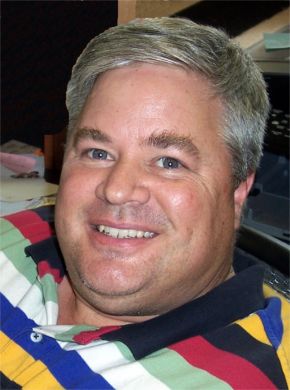
Page
Howe
Site HQ Inc.
|
|
with an emphatic Yes! In fact, he says the basics
really haven't changed much at all. "In many ways, this
feels like 2003 all over again," Howe said. "The same
types of things I was doing then I'm still doing now with the
same rewards - so I guess I should keep doing it!"
|
|
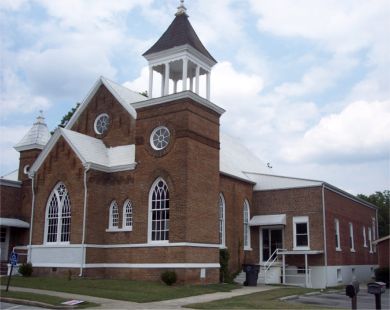
This
converted church is home for
Site HQ's Manchester, Tennessee offices |
|
| Californian, wound up in south
central Tennessee, is a a key part of the boom, bust and
rebirth story that led him to domains, so we will come
back to that a bit later - but first things first. |
|
|
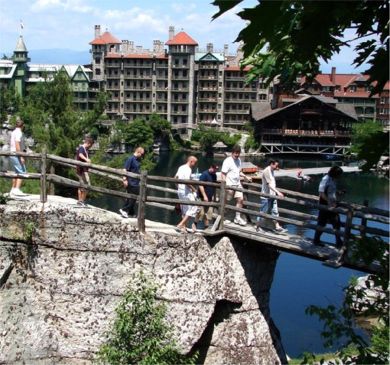
Domainers
cross a bridge at the Mohonk Mountain
Resort during the Sedo Pro Forum in June 2007 |
| and delighted to bump into each
other after more than two decades and Burgess was
completely fascinated with Howe's domain endeavors,
agreeing with Page that it was indeed a unique and ideal
application of his liberal arts training. |
|
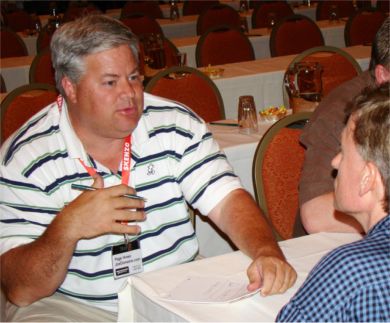
Howe
at a T.R.A.F.F.I.C. Orlando networking session
May 2008 |
|
| quickly dawned on us that much
more could be delivered on this wire into people's homes
than just the dozen TV channels they were used to
getting," Howe said. |
|
|
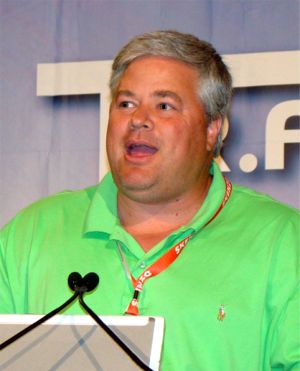
Howe
speaking at T.R.A.F.F.I.C. Orlando
May 2008 |
| "I wanted to be able to
stay in business and try to recoup the investments that a
lot of people had made with me," Howe said. Before
everything had gone south his investment group had started
dabbling in domains. "We had originally stumbled into
the business after reading a story about Chris Ambler
trying to get ICANN to approve a new .web
extension," Howe recalled. |
|
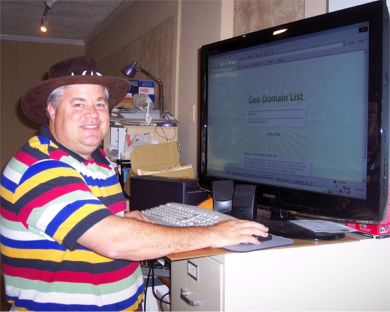
The
story behind the hat: At the T.R.A.F.F.I.C. West
conference in Las Vegas in February 2008 Australia's
Michael Gilmour donated this hat from his homeland to
be auctioned off to raise funds for the domain industry's
non-profit trade group, the Internet
Commerce Association. Howe won that
auction and the hat with a generous bid of $5,000.
In the photo above, Howe sports his new headgear at his
Manchester, Tennessee office. |
|
|
|
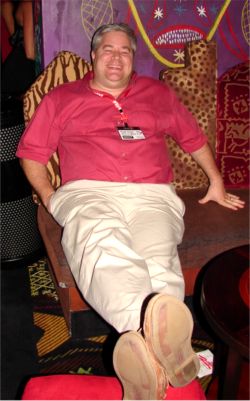
Discovering
DNForum.com helped
Howe get back on track |
|
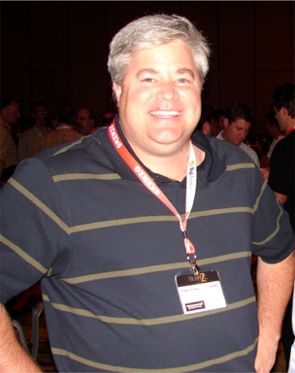
Good
reason to smile: Howe at
T.R.A.F.F.I.C. New York 2007
right after his domain Seniors.com
sold for $1.8 million |
|
|
|
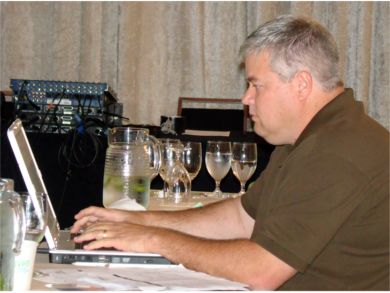
Howe
racking up domain purchases at the
2008 GeoDomain Expo live auction in Chicago. |
| SantaClara.com and a
group of related domains for $85,000. He has also
added many other small to medium size cities that give him
a network that currently covers about 1.5 million
people. |
|
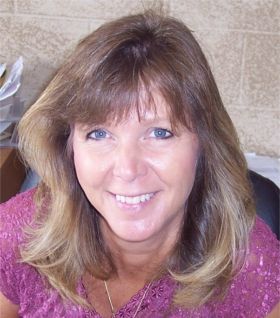
Page's
wife Penny serves as
Site HQ's Office Manager |
|
| write content. Those helping
hands are critical to keep Site HQ's growth on track and
allow Howe to handle all of the irons he has in the fire. |
|
| He hopes to eventually roll out a sales site
for small business end users at JoeDomains.com
(a project he calls Domains for the Average Joe). The site
would sell names at different price points, starting at $99
and escalating to high value premium names so the business
buyers would have a choice that would fit their budgets.
The site would also offer a lot of hand holding in name
selection, taking care of the hosting, etc. so that it
would be a one-stop shop for small businesses that are
confused by the intricacies involved in acquiring a domain
and getting a site online.
Howe is also writing a book called Domain Name
Investing: How to Make Money in Internet Real Estate
that he would like to have out by the end of the year but
the release date has been a constantly moving target.
"The book has been on hold because there has been
such a great |

|
| fertile environment to go do
everything I am telling people in the book to go do and I
said why don't I just go do that!" As of this
writing, that's exactly where Howe is - out there doing
it and after all he has been through he is loving
every minute of it. |
|
|
|
|
|
Return to DN
Journal Home Page
|
|
|
Home
Domain Sales
YTD Sales Charts
Latest
News The Lowdown
Articles
Legal Matters Dear Domey
Letters
to Editor Resources
Classified Ads
Archive
About Us |
|

|
|

|















